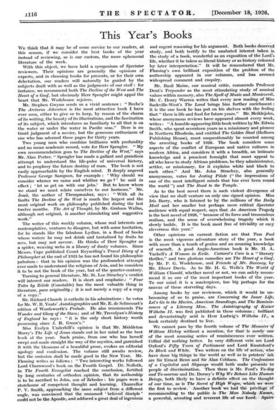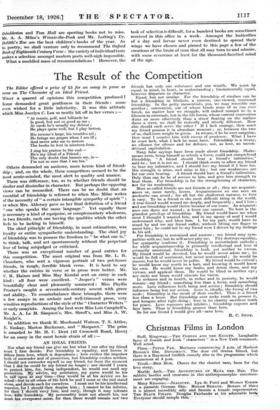This Year's Books
WE think that it may be of some service to our readers, at this season, if we consider the best books of the year instead of reviewing, as is our custom, the more ephemeral literature of the week.
With this object, we have held a symposium of Spectator reviewers. Their opinions are generally the opinions of experts, and in choosing books for presents, or for their own delectation, our readers will naturally be guided by the subjects dealt with as well as the judgments of our staff : for instance, we recommend both The Decline of the West and The Heart of a Goof, but obviously Herr Spengler might appal the heart that Mr. Wodehouse rejoices.
Mr. Stephen Gwynn sends us a vivid sentence : " Beebe's The Arcturus Adventure is the most attractive book I have ever seen, either to give or to keep, by reason of the charm of its writing, the beauty of its illustrations, and the fascination of its subject, which introduces us familiarly to all that is on the water or under the water in Pacific seas." Here is no timid judgment of a novice, but the generous enthusiasm of one who has adorned these pages for thirty years.
Two young men who combine brilliance with profundity and no mean academic record, vote for Herr Spengler. " My own recommendation goes to The Decline of the West," says Mr. Alan Porter. " Spengler has made a gallant and grandioie attempt to understand the life-pulse of universal history, and to prophesy the future destiny of man. The book is not easily approachable by the English mind. It deeply angered Professor George Sampson, for example : ' Why should we consider whence we came and whither we go ? ' he said in effect ; ' let us get on with our jobs.' But to know where we stand we must relate ourselves to our horizons." Mr. Joad, the author of Thrasyrnachus, says : " With all its faults The Decline of the West is much the largest and the most original work on philosophy published during the last twelve months. The Art of Thought, by Mr. Graham Wallas, although not original, is another stimulating and suggestive work."
The writer of this weekly column, whose real interests are contemplative, ventures to disagree, but with some hesitation, for he stands like the fabulous Lydian, in a flood of books whose waters he may not drink and tantalized by fruits he sees, but may not savour. He thinks of Herr Spengler as a spider, weaving webs in a library of dusty volumes. Since Messrs. Cape published Count Keyserling's Travel Diary of a Philosopher at the end of 1925 he has not found his philosophic pabulum : that in his opinion was the profoundest attempt ever made to understand the religions of Asia, and he considers it to be not the book of the year, but of the quarter-century.
Turning to general literature, Mr. St. Loe Strachey's verdict will interest our readers. It is short and emphatic.: " Four Tales by Wide (Constable) has the most valuable thing in literature, pure originality ; it is not merely a copy of a copy of a copy."
Mr. Richard Church is catholic in his admirations : he votes for Mr. W. B. Yeats' Autobiographies and Mr. E. de Selincourt's edition of Wordsworth's Prelude. He also recommends The Wonder and Glory of the Stars; and of Mr. Trevelyan's History of England he says : " it is the only short history worth possessing since J. R. Green's."
Miss Evelyn Underhill's opinion is that Mr. Middleton Murry's The Life of Jesus stands out in her mind as the best book of the year. Such praise, from one who has herself swept and made straight the way of the mystics, and garnished it with the blossoms of a beautiful prose, evokes an editorial apology and confession. The volume still awaits review, but the omission shall be made good in the New Year. Mr. Fleming writes as follows : " Two interesting works followed Lord Charnwood's book on the Fourth Gospel. Dr. Nolloth, in The Fourth Evangelist reached the conclusion, fortified by long centuries of orthodox opinion, that its authorship is to be ascribed to John, son of Zebedee : his pages were a storehouse of competent thought and learning. Chancellor P. V. Smith, approaching the same subject from a different angle, was convinced that the unnamed btloi-ed disciple ' could not be the Apostle, and adduced a great deal of ingenious
and cogent reasoning for his argument. Both books deserved study, and both testify to the unabated interest taken in the study of a book, wonderful as an exposition of the Lord's life, whether it be taken as literal history or as history coloured by later interpretation." It will be remembered that Mr. Flaming's own brilliant exposition of the problem of the authorship appeared in our columns, and has aroused widespread comment and enquiry.
Mr. Basil Maine, our musical critic, commends Professor Dent's Terpander as the most stimulating study of musical values within memory, also The Spell of Music and Monteverdi. Mr. C. Henry Warren writes that every new reading of Miss Sackville-West's The Land brings him further enrichment : it is the one book he has put on his shelves with the feeling that " there is life and food for future years." Mr. Meiklejohn, whose anonymous reviews have appeared almost every week, writes : " A humble-appearing little book written by Mr. Edwin Smith, who spent seventeen years as a missionary and pioneer in Northern Rhodesia, and entitled The Golden Stool (Holborn Publishing House), must unquestionably be counted among the arresting books of 1926. The book considers some aspects of the conflict of European and native cultures in modem Africa, and considers it with a breadth, an intimate knowledge and a prescient foresight that must appeal to all who have to study African problems, be they administrator, settler, or missionary, for it explains white and black to each other." And Mr. John Strachey, also generally anonymous, votes for Jesting Pilate (" the impressions of one of the most intelligent minds that has ever been round the world ") and The Road to the Temple. -
As to the best novel there is such violent divergence, of view that we shall venture on only one signed opinion. Miss Iris Barry, who is listened to by the millions of the Daily Mail and her smaller but perhaps more critical Spectator audience with equal respect, says that An American Tragedy is the best novel of 1926, " because of its force and tremendous realism, and the sense of overwhelming tragedy which it slowly builds. It is the book most free of triviality or easy cleverness this year."
Other opinions on current fiction are that Tont Fool is the most vigorous adventure story of the year, a book with more than a touch of genius and an amazing knowledge of seacraft. A good Anglo-American book is Mr. H. A. Vachell's A Woman in Exile. Collard's Cure is a literary thriller," and two glorious comedies are The Heart of a Goof, by Mr. P. G. Wodehouse, and Friends of Mr. Sweeney, by Mr. Elmer Davis. As to Mr. H. G. Wells's The World of William Clissold, whether novel or not, we- can safely recom- mend it as one of the most important books of the year. To our mind it is a masterpiece, too big perhaps for the canvas of these starveling days. .
Among books by our reviewers, which it would be un- becoming of us to praise, are Concerning the Inner Life, Let's Go to the Movies, American Soundings, and The Reminis- cences of a Literary Man. The Autobiography of Kaiser Wilhelm II. was first published in these columns ; brilliant and devastatingly acid is Herr Ludwig's Wilhelm H., a book certainly destined to live. - .
We cannot pass by the fourth volume of The Memoirs of William Hickey without a mention, for that is surely one of the most amusing series of reminiscences ever written. CeLlini did nothing better. In very different vein are Lord Oxford's Fifty Years of Parliament and Lord Knutsford's In Black and White. Two writers on the life of action, who have done big things in the world as well as in printers' ink arc Sir Ernest Benn and Sir Alan Cobham. The Confessions of a Capitalist and Skyways would both make presents to people of discrimination. Then there is Mr. Ford's To-dcty and To-morrow and Dr. Dorsey's Why We Behave Like Human Beings, both likely to have a definite effect on the thought of our time, as is The Secret of High Wages, which we were the first to review. Another book we had the privilege of recommending to the public is The. Man Nobody Knows, a powerful, arresting and reverent life of our Lord. Squire- Osbakleston and Tom Hall are sporting books not to miss. Mr. A. A. Milne's Winnie-the-Pooh and Mr. Lofting's Br. Dolittk's Zoo are the best children's books of the year. As to poetry, we shall venture only to recommend The Oxford Book of Eighteenth Century Verse : the variety of individual taste makes a selection amongst modern poets well-nigh impossible.
What a muddled mass of recommendations ! However, the task of selection is difficult, for a hundred books are sometimes received' in this office in a week. Amongst the butterflies of a day and larvae never even destined to spread their wings we have chosen and pinned to this page a few of the creations of the brain of man that all may turn for and admire, with some reverence at least for the thousand-facetted mind of the age.











































 Previous page
Previous page